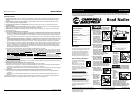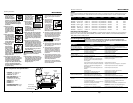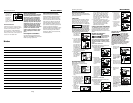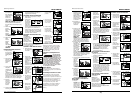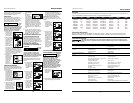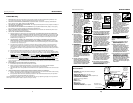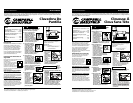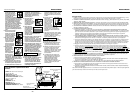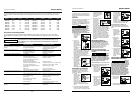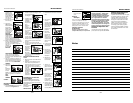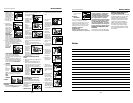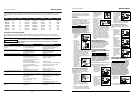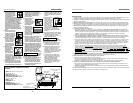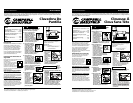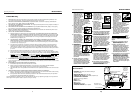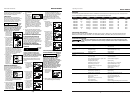
● Avoid long extended periods of
work with the nailer. Stop using the
nailer if you feel pain in hands or
arms.
● Always check that
the Work Contact
Element (WCE) is
operating proper-
ly. A nail could
accidentally be dri-
ven if the WCE
is not working
properly. Personal
injury may occur (see "Checking the
Work Contact Element" Section.)
● Disconnect air supply and release ten-
sion from the pusher before attempt-
ing to clear jams because fasteners
can be ejected from the front of the
nailer. Personal injury may occur.
Notice indicates
important informa-
tion, that if not followed, MAY cause
damage to equipment.
● Avoid using the nailer when the mag-
azine is empty. Accelerated wear on
the nailer may occur.
● Clean and check all air supply hoses
and fittings before connecting the
nailer to an air supply. Replace any
damaged or worn hoses or fittings.
Tool performance or durability may
be reduced.
● Air compressors providing air to the
nailer should follow the requirements
established by the American National
Standards Institute Standard B19.3-
1991; Safety Standard for
Compressors for Process Industries.
Contact your air compressor manufac-
turer for information.
!
NOTICE
● Do not drive a nail
on top of other
nails. The nail could
glance and cause
death or a serious
puncture wound.
● Do not operate or
allow anyone
else to operate
the nailer if any
warnings or
warning labels
are not legible. Warnings or warn-
ing labels are located on the nailer
magazine and body.
● Never leave the nailer unattended
or connected to an air compressor
when not in use. Serious personal
injury can occur if someone picks up
and uses the nailer without know-
ing the correct way to operate the
nailer.
● Do not drop or throw the tool.
Dropping or throwing the tool can
result in damage that will make the
tool unusable or unsafe. If the tool
has been dropped or thrown, exam-
ine the tool closely for bent, cracked
or broken parts and air leaks. STOP
and repair before using or serious
injury could occur.
Caution indicates
a potentially haz-
ardous situation which, if not avoided,
MAY result in minor or moderate
injury.
● Do not modify or alter the nailer or
any nailer parts. Do not use the nailer
if any shields or guards are removed
or altered. Do not use the nailer as a
hammer. Personal injury or tool
damage may occur.
● Protect your eyes and
ears. Wear Z87 safety
glasses, with side
shields. Wear hearing
protection. Employers
and users are responsible for ensuring
the user or anyone near the nailer
wears this safety protection. Serious
eye injury or permanent hearing loss
could result.
● Do not use a check
valve or any other fit-
ting which allows air
to remain in the nail-
er. Death or serious
personal injury could
occur.
● Never place hands or
any other body parts
in the nail discharge
area of the nailer. The
nailer might eject a
fastener which could
result in death or seri-
ous personal injury.
● Never carry the
nailer by the air
hose or pull the
hose to move the
nailer or a compres-
sor. Keep hoses
away from heat, oil
and sharp edges.
Replace any hose that is damaged,
weak or worn. Personal injury or tool
damage could occur.
● Always assume the nailer contains
nails. Never use the nailer as a toy. Do
not engage in horseplay. Always keep
others at a safe distance from the
work area in case of accidental dis-
charge of nails. Never point the nailer
at anyone. Accidental triggering of
the nailer could result in death or seri-
ous personal injury.
2
!
WARNING
Magazine
Contact Trip
Trigger
Nailer Components And Specifications
Model NB0040
Operating Instructions
• REQUIRES: 1.3 SCFM with 10
nails per minute @ 90 psi
• AIR INLET: 1/4” NPT
• NAIL SIZE RANGE: 5/8” to 2”
• MAGAZINE CAPACITY:
100 Nails per load, 18 gauge
• WEIGHT: 2 lbs., 13 oz.
• LENGTH: 9
1
⁄
2”
• HEIGHT: 9
1
⁄
2”
• MAXIMUM PRESSURE: 110 psi
• PRESSURE RANGE: 70-110 psi
Nail Discharge Area
Nail Loading Area
Adjustable Exhaust
Work Contact
Element (WCE)
Warning
Labels
www.campbellhausfeld.com
Connector
Reload Indicator
Modelo NB0040
Manual de Instrucciones
6 Sp
FB001600 15,9mm (5/8”) Calibre 18 Galvanizado De puntilla/Café Adhesivo 100 5000
FB002000 19,1mm (3/4”) Calibre 18 Galvanizado De puntilla/Café Adhesivo 100 5000
FB002500 25,4mm (1”) Calibre 18 Galvanizado De puntilla/Café Adhesivo 100 5000
FB003000 31,8mm (1
1
⁄
4”) Calibre 18 Galvanizado De puntilla/Café Adhesivo 100 5000
FB004000 3,81 cm(1
1
⁄
2”) Calibre 18 Galvanizado De puntilla/Café Adhesivo 100 5000
FB004500 4,45cm(1
3
⁄
4”) Calibre 18 Galvanizado De puntilla/Café Adhesivo 100 5000
FB005000 5,08cm (2”) Calibre 18 Galvanizado De puntilla/Café Adhesivo 100 5000
Clavos
Estos clavos para acabado de Campbell Hausfeld los puede comprar en su tienda más cercana. Si necesita ayuda para encon-
trar un artículo, comuníquese al 1-800-543-6400. Los clavos de Campbell Hausfeld cumplen o exceden el estándar ASTM
F1667
Información de intercambio
Los clavos usados con la clavadora para acabado NB0030 de Campbell Hausfeld también se pueden usar con las clavadoras:
Bostitch T31-1, T29-30, BT-35, BT50, Duofast BB4440, Hitachi NT45A , Paslode 2138-F40 , Porter Cable BN125, BN200, Sears
18409, 18424, and Senco SLP20, LS2, LS5.
Guía de Diagnóstico de Averías
Deje de usar la clavadora inmediatamente si alguno de los si guientes problemas ocurre.
repuestos. Podría ocasionarle heridas graves. Cualquier reparación o reemplazo de piezas los
debe hacer un técnico calificado personal de un centro autorizado de servicio.
!
ADVERTENCIA
Problema Causa Solución
Debe reemplazar los anillos en O & chequear el fun-
cionamiento del elemento de funcionamiento al contacto
Debe apretar los tornillos
Debe reemplazar los anillos en O
Debe reemplazar la defensa
Debe apretar los tornillos
Debe reemplazar la defensa
Debe limpiar el canal del sistema de impulso
Debe limpiar el cargador
Debe reemplazar el resorte
Chequée las conexiones, la manguera o el compresor
Debe reemplazar los anillos en O. Lubríquelos.
Debe reemplazar los anillos en O
Debe apretar los tornillos y las conexiones
Debe reemplazar el empaque
Necesita lubricar la clavador
Debe reemplazar el resorte
Debe reemplazar las partes internas dañadas
Debe reemplazar la guía
Debe usar los clavos recomendados para esta clavadora
Reemplácelos con clavos en buenas condiciones
Debe apretar los tornillos
Debe reemplazar el mecanismo de impulse de clavos
Vea las instrucciones de cómo cargar/descargar la
clavadora
Debe reemplazar los anillos en O o los sellos
Hay una fuga de aire en el
área de la válvula del gatillo
Hay una fuga de aire entre la
cubierta y la boquilla
Hay una fuga de aire entre la
cubierta y la tapa
La clavadora deja de clavar un
clavo
La clavadora funciona lenta-
mente o pierde su potencia
Hay clavos atascados en la
clavadora
Hay una fuga de aire en el
vástago de la válvula del gatillo
Los anillos en O de la cubierta de la válvula del
gatillo están dañados
Los tornillos de la cubierta están flojos
Los anillos en O están dañados
La defensa está dañada
Los tornillos están flojos
La defensa está desgastada
La boquilla está sucia
La suciedad o daños evitan el desplazamiento
libre de los clavos o el mecanismo de impulso
en el cargador
El resorte del mecanismo de impulso está dañado
El flujo de aire hacia la clavadora es inadecuado
El anillo en O del pistón está desgastado o le
falta lubricación
Los anillos en O de la válvula del gatillo están
dañados
Hay fugas de aire
Hay una fuga en el empaque de la tapa
La clavadora no está bien lubricada
El resorte de la tapa del cilindro está roto
El orificio de salida de la tapa está obstruído
La guía del mecanismo de impulso está desgastada
Los clavos no son del tamaño adecuado.
Los clavos están doblados
Los tornillos del cargador o de la boquilla están flojos
El mecanismo de impulso está dañado
Los clavos están mal colocados
Los anillos en O o los sellos están dañados
Calibre Clavos por Clavos por
Modelo # Longitud
del cuerpo
Acabado Cabeza Unión
línea Caja



